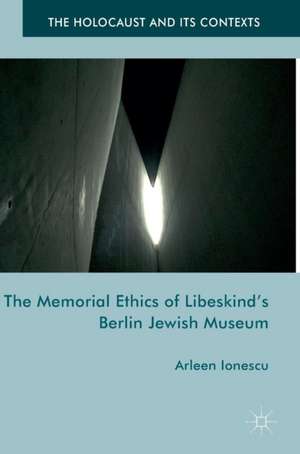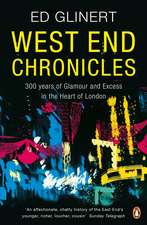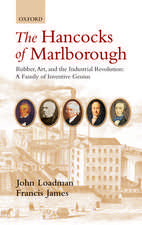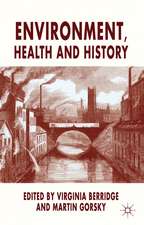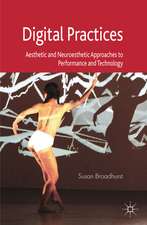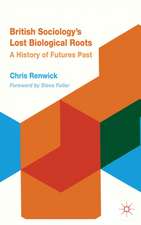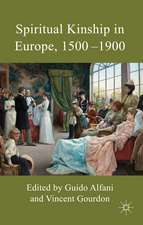The Memorial Ethics of Libeskind's Berlin Jewish Museum: The Holocaust and its Contexts
Autor Arleen Ionescuen Limba Engleză Hardback – 28 feb 2017
Din seria The Holocaust and its Contexts
-
 Preț: 280.94 lei
Preț: 280.94 lei - 20%
 Preț: 690.44 lei
Preț: 690.44 lei -
 Preț: 307.44 lei
Preț: 307.44 lei - 20%
 Preț: 690.75 lei
Preț: 690.75 lei - 18%
 Preț: 890.68 lei
Preț: 890.68 lei - 18%
 Preț: 891.48 lei
Preț: 891.48 lei -
 Preț: 392.60 lei
Preț: 392.60 lei - 15%
 Preț: 693.39 lei
Preț: 693.39 lei - 15%
 Preț: 643.34 lei
Preț: 643.34 lei - 15%
 Preț: 642.36 lei
Preț: 642.36 lei - 18%
 Preț: 734.44 lei
Preț: 734.44 lei -
 Preț: 392.60 lei
Preț: 392.60 lei - 18%
 Preț: 728.11 lei
Preț: 728.11 lei -
 Preț: 386.81 lei
Preț: 386.81 lei - 18%
 Preț: 782.42 lei
Preț: 782.42 lei -
 Preț: 387.75 lei
Preț: 387.75 lei - 18%
 Preț: 723.06 lei
Preț: 723.06 lei - 15%
 Preț: 589.51 lei
Preț: 589.51 lei - 18%
 Preț: 730.35 lei
Preț: 730.35 lei -
 Preț: 390.25 lei
Preț: 390.25 lei - 15%
 Preț: 592.77 lei
Preț: 592.77 lei - 18%
 Preț: 730.47 lei
Preț: 730.47 lei - 15%
 Preț: 644.18 lei
Preț: 644.18 lei - 9%
 Preț: 642.68 lei
Preț: 642.68 lei -
 Preț: 197.26 lei
Preț: 197.26 lei -
 Preț: 382.36 lei
Preț: 382.36 lei -
 Preț: 483.92 lei
Preț: 483.92 lei - 18%
 Preț: 780.16 lei
Preț: 780.16 lei -
 Preț: 388.72 lei
Preț: 388.72 lei -
 Preț: 394.51 lei
Preț: 394.51 lei
Preț: 894.03 lei
Preț vechi: 1090.28 lei
-18% Nou
171.13€ • 185.94$ • 143.84£
Carte tipărită la comandă
Livrare economică 21 aprilie-05 mai
Specificații
ISBN-10: 1137538309
Pagini: 240
Ilustrații: XIII, 305 p. 2 illus. in color.
Dimensiuni: 148 x 210 x 19 mm
Greutate: 0.53 kg
Ediția:1st ed. 2017
Editura: Palgrave Macmillan UK
Colecția Palgrave Macmillan
Seria The Holocaust and its Contexts
Locul publicării:London, United Kingdom
Cuprins
Introduction: A Museum with a View.- 1. Memory, History, Representation.- 2. Representing the Holocaust in Architecture.- 3. Ethics as Optics: Libeskind's Berlin Jewish Museum.- 4. Extension to Libeskind's Museum.- Epilogue.
Notă biografică
Arleen Ionescu is Professor of English Literature and Critical Theory in the Philology Department at Universitatea ‘Petrol-Gaze’ din Ploieşti, Romania. She has published widely on modernist writers such as Joyce, Woolf and Beckett, as well as on Blanchot and Derrida. She is the author of Romanian Joyce: From Hostility to Hospitality (2014).
Textul de pe ultima copertă
This book is a detailed critical study of Libeskind’s Berlin Jewish Museum in its historical, architectural and philosophical context. Emphasizing how the Holocaust changed our perception of history, memory, witnessing and representation, it develops the notion of ‘memorial ethics’ to explore the Museum’s difference from more conventional post-World War Two commemorative sites. The main focus is on the Museum as an experience of the materiality of trauma which engages the visitor in a performative duty to remember. Arleen Ionescu builds on Levinas’s idea of ‘ethics as optics’ to show how Libeskind’s Museum becomes a testimony to the unpresentable Other. Ionescu also extends the Museum’s experiential dimension by proposing her own subjective walk through Libeskind’s space reimagined as a ‘literary museum’. Featuring reflections on texts by Beckett, Celan, Derrida, Kafka, Blanchot, Wiesel and Selma Meerbaum-Eisinger (Celan’s cousin), this virtual tour concludes with a brief account of Libeskind’s analogous ‘healing project’ for Ground Zero.
Caracteristici
Develops our understanding of the notion of ‘memorial ethics’
Explores Levinas’s ‘ethics as optics’ in Libeskind’s Berlin Jewish Museum
Creates a virtual ‘literary extension’ to Libeskind’s Museum
Descriere
This book is a detailed critical study of Libeskind’s Berlin Jewish Museum in its historical, architectural and philosophical context. Emphasizing how the Holocaust changed our perception of history, memory, witnessing and representation, it develops the notion of ‘memorial ethics’ to explore the Museum’s difference from more conventional post-World War Two commemorative sites. The main focus is on the Museum as an experience of the materiality of trauma which engages the visitor in a performative duty to remember. Arleen Ionescu builds on Levinas’s idea of ‘ethics as optics’ to show how Libeskind’s Museum becomes a testimony to the unpresentable Other. Ionescu also extends the Museum’s experiential dimension by proposing her own subjective walk through Libeskind’s space reimagined as a ‘literary museum’. Featuring reflections on texts by Beckett, Celan, Derrida, Kafka, Blanchot, Wiesel and Selma Meerbaum-Eisinger (Celan’s cousin), this virtual tour concludes with a brief account of Libeskind’s analogous ‘healing project’ for Ground Zero.
